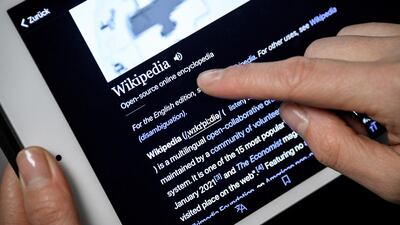Twenty years of internet time is an eternity. Over the past two decades we’ve seen the likes of MySpace and blogging culture come and go, Facebook and Instagram have grown from niche networking platforms to big data and marketing behemoths, world leaders have risen and fallen within Twitter’s 280 characters and Google has become so much more than a search engine. There have been multi-billion dollar IPOs and bankruptcies. Yet in the ever-changing digital landscape of big tech there has been one constant: Wikipedia, the free encyclopaedia.
Co-founders Jimmy Wales and Larry Sanger registered wikipedia.org and wikipedia.com as domains and launched their first edition, in English, on January 15, 2001. Their vision was as simple as it was audacious: "Imagine a world in which every single person on the planet is given free access to the sum of all human knowledge. That's what we're doing," Wales said in 2004.
What started as an attempt to create a free, open-collaborative online encyclopaedia has largely held true to that mission statement. After 20 years it remains the world's biggest encyclopaedia, with more than 55 million articles and more than 3.7 billion words on the English site alone. It attracts 1.7 billion unique visitors per month. And perhaps most notably – it is still a charity.
The business of trust
How did Wikipedia achieve so much without selling a single share? Its financial reports suggest that non-profit status is more help than hindrance. For the fiscal year 2019-20, it held net assets of $191.26 and has made year-on-year profit since 2004-05. Unlike other tech giants, Wiki doesn't have to worry about appeasing shareholders with ad revenue and new, 'fleet'-like features to keep users engaged. Instead it relies on a steady stream of donors who buy into its philosophy and public trust, the latter of which is in short supply.
Yet Wikipedia has managed to cultivate both. Donations for the 2019-20 fiscal year totalled over $120 million. Despite tech's crisis of trust – 72 per cent of respondents in a recent survey think Facebook has too much power – Wiki manages to stay out of the headlines. Perhaps because, counterintuitively, they warn you not to trust them. In a 'Ten things you may not know about Wikipedia' essay there is a disclaimer, saying, "We do not expect you to trust us."
A global community of ‘Wikipedians’
Its primary method for maintaining public confidence and content production are 'Wikipedians', or volunteer editors. There are more than 40 million users registered, but less than 200,000 are active and edit at least once per month. These trained Wikipedians, outside of their day jobs, write, edit and maintain Wiki's millions of pages and, with the help of AI and normative editing rules, spot disinformation quickly.
On January 14, hours before turning 20, Wikipedia English reached its billionth edit. Its longevity in a Silicon Valley strewn with the carcasses of failed digital start-ups portends billions more edits in the coming decades. If it survives, it will be due to faithful Wikipedians like Ayokanmi Kaizen, a veteran editor and Wikimedia Nigeria strategist based in Lagos.
“I saw content gaps for my own country Nigeria and about the African continent,” Mr Kaizen recalled of why he got started. “The people that were contributing were non-Nigerian.” His desire to help add to the global community of information has since led him to fill the void, such as creating articles promoting gender equality in Nigeria.
Like many people last year, new recruit Leah Lockhart, from Glasgow, Scotland, found herself with more time on her hands because of the Covid pandemic when she decided to join a Wikipedia ‘Editathon’. During the event, she learned the ropes and “helped populate Wikipedia with missing articles about women in sport in Scotland”.
Mr Kaizen and Ms Lockhart lead lives apart. Yet what drew them to Wiki was a similar aspiration to improve access to information and learn about under-represented people, and to share that knowledge with the world. “My focus is on publishing and editing articles about people who are not white, people who don't identify as cisgender male, and people with disabilities,” Ms Lockhart said. “Wikipedia means learning ... it means community.”
Community is a common theme that, regardless of background or focus, all Wikipedians espouse. It is fundamental to the vision that Mr Wales and Mr Sanger spoke of in the beginning.
Will Wikipedia be online in 20 years?
No one in big tech is immune to the maladies of mis- and disinformation, not least Wiki. Yet its members seem assured that it has the structures in place to cope.
"I am proud and confident to say that Wikipedia will survive the next 40 and even more years," argued Mr Kaizen, because of its processes of "collaboration" and "self-sustainability" in content production, accountability and strategy.
Despite challenges such as lack of diversity in content, Ms Lockhart agreed. “I am not sure what it might look like then, but given the amount of energy and talent in the pool of people involved in keeping it running, I'm sure it will keep going somehow.”
At a time when the Facebooks, Twitters and Googles of the world are being challenged by governments and users alike, Wikipedia seems shielded against extremes. This is likely due to its unyielding dedication to its founding values.
As Mr Kaizen put it, Wikipedia is open to changes in interface “to suit the next ten years” but the mission remains the same: “To provide the sum of human knowledge so that everybody around the world has access to free information at their fingertips. That’s the most important thing.”

